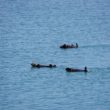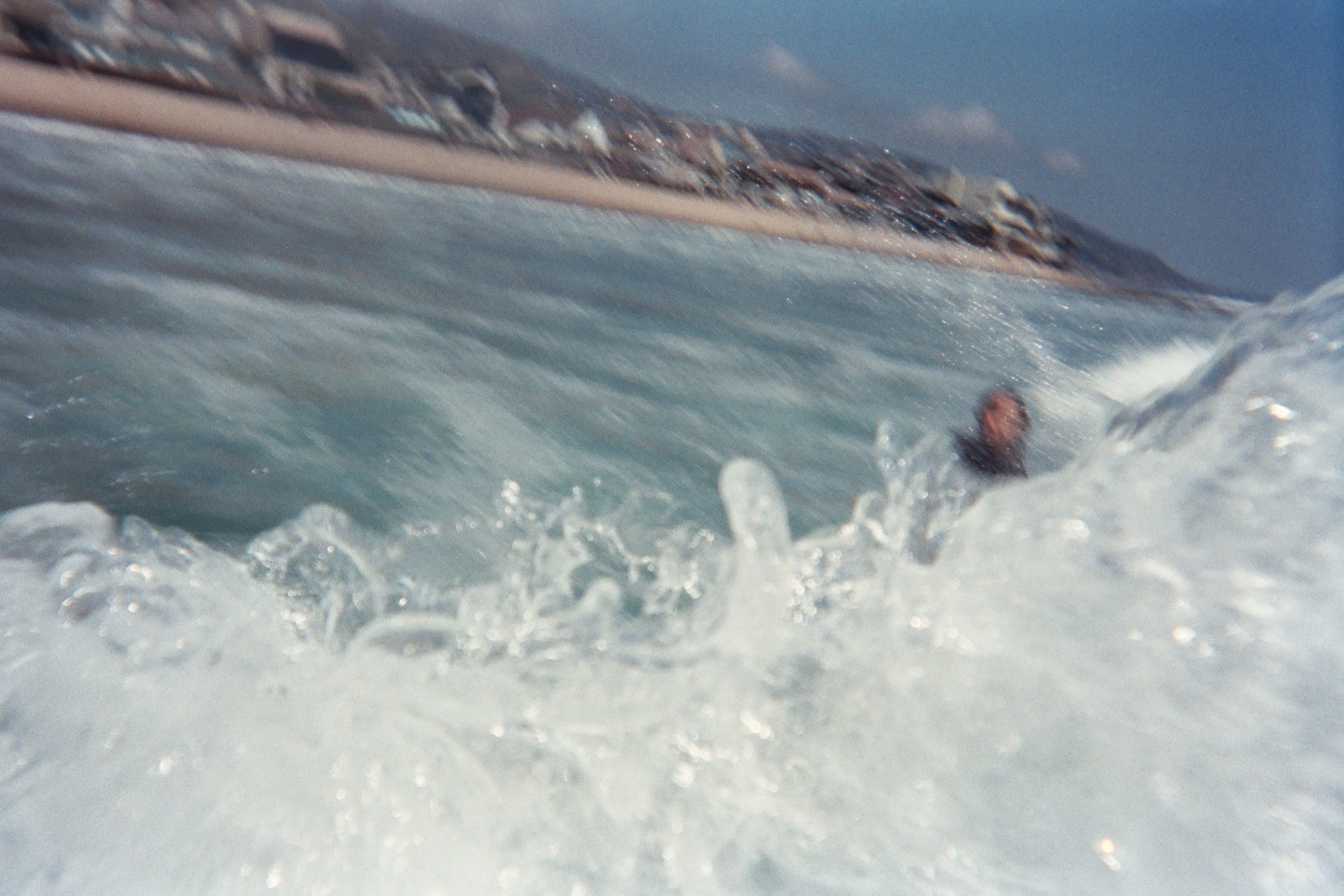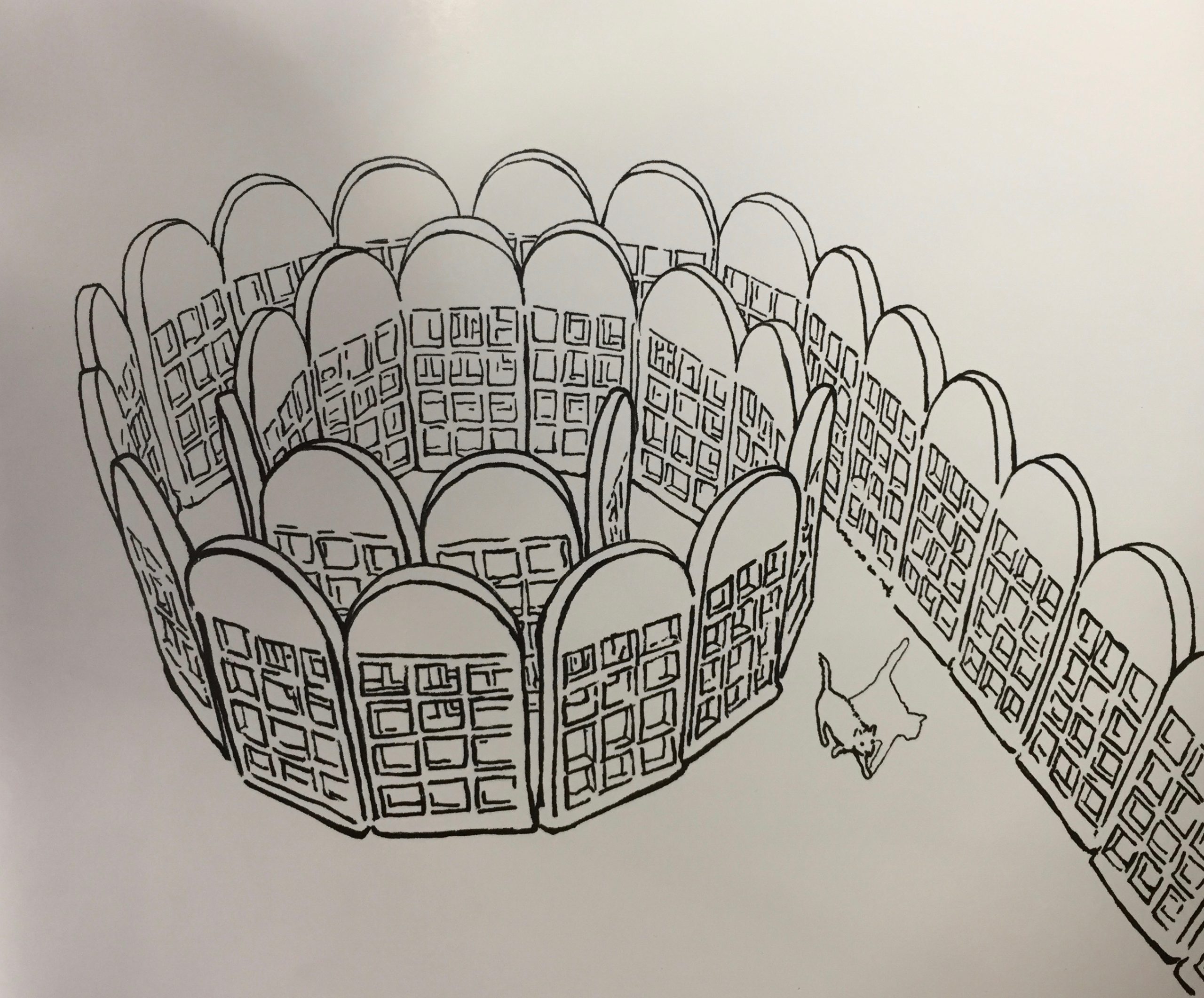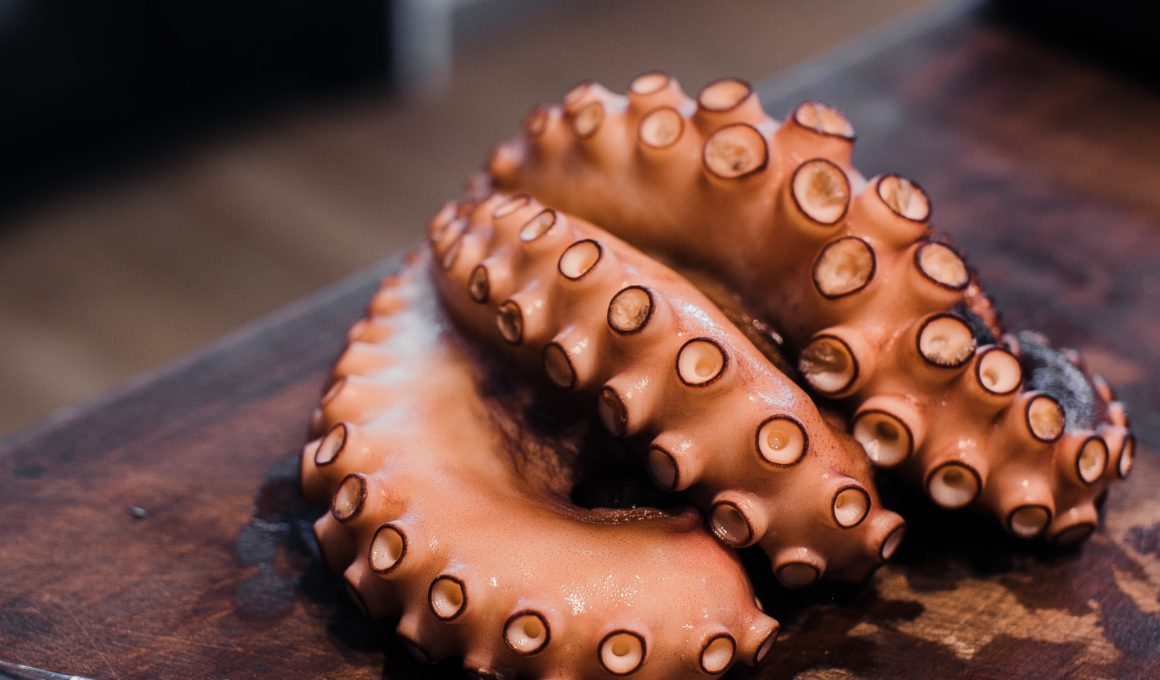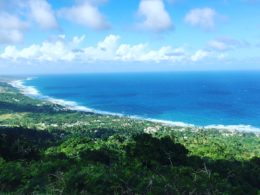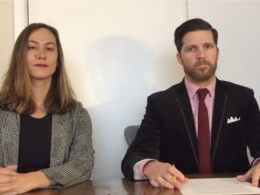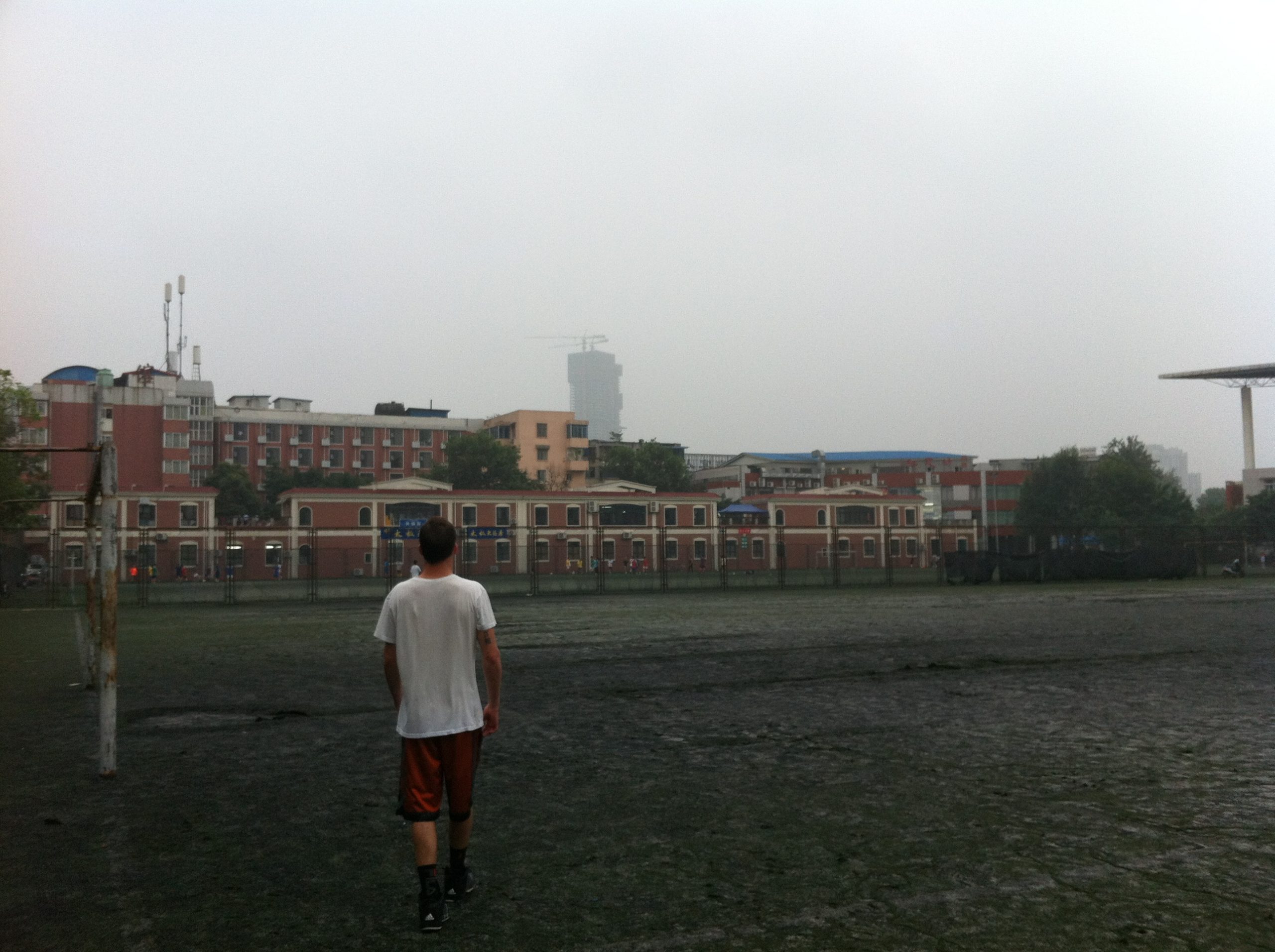1
A platter carries a writhing blob of ocean-dweller from the tank out front, through the restaurant’s central aisle, and into the kitchen. Structural integrity is a function of environment, and this is not an environment suited to a spineless sea creature. Still, the tentacled blob battles for life on instinct. Slimy, purplish-white with dark speckles, the head slides, dragged behind the tentacles that flop forward like sentient Slinkys cased in wet socks. An arm suctions to the bottom of the platter and begins pulling the head off; attempting flight from doom.
I, a foreigner (waegukin), am given the skinny by a coworker as we take soju shots to prepare for the meal. Because these are larger sannakji, they being taken to the kitchen where they are cut up prior to consumption. The platters that reemerge and arrive at our table for eight feature several sannakji, each chopped into in eight parts.
Even dismembered, the instinct to live pings through the chopped nerves. The pieces keep wriggling. The chunks, still slippery, are almost impossible to pick up with chopsticks. The pieces writhe and suction onto one another as though they might reform into a whole octopus. Disconnected from their eyes, some pieces clamber off the plate with a dainty squish, blindly evading terrestrial mouths. I was confident that my first month teaching in Korea had prepared me for this rite of passage.
Bryan, our veteran guide, reminds us to chew thoroughly, as several people die each year from asphyxiation when the suckers adhere to the inside of a lazy, ignorant throat. It’s January 3rd, so each of the year’s ‘American dies by asphyxiation while eating traditional South Korean delicacy’ headlines is up for grabs.
I don’t chew on that possibility as long as I might, because once I manage to get a chunk of octopus between my rectangular, metal chopsticks, into some soy sauce, then into my mouth, I can’t imagine under-chewing. The suckers attach to my teeth and lips, the piece of tentacle continues pulsing. The meat is like cheap bubble gum that has lost all flavor, and breaking it down to bits that I can swallow makes my jaw sore.
I pick through the pieces; ink sack, heart, beak, and tentacle are consumed over the course of nearly an hour, as my mouth becomes a slaughterhouse for these disjointed pieces. Kimchi, rice, beer, and soju shots chase bites of sannakji.
With all the chewing, the meal drags on and I am not getting full. I am, though, beginning to sweat and flush. Hives are breaking out on my underarms. I had allergies as a youth, would break out in hives triggered by unknown allergens. The hives mostly stopped after puberty, but sometimes, when imbibing alcohol, I am prone to glowing. When I get flush from alcohol, my pulse increases, my face reddens and I get hot. I convince myself that the hives are just part of a particularly aggravated response to the soju and beer.
I drink some water and go to the restroom to relieve myself. In the restroom, it becomes evident that the reaction is not from the alcohol. Hives proliferate on sensitive areas as would sometimes happen during extreme allergic episodes when I was a child. I decide I won’t drink more and will go home after the meal.
2
Bundled against the frigid South Korean winter, a light snow falls outside as we huddle to discuss plans for the rest of the evening. I acknowledge that I am not feeling well.
“Are you gonna be alright?” Bryan asks.
“Yeah, I think it’s just a reaction to the alcohol,” I reply
“Do you have a phone yet?” Nina asks.
“No.”
“What room are you in?” Nina, again.
“704,” Iain, the first friend I made in Korea, answers for me.
“704, ok, well, we will check on you later,” Leo offers.
“Yeah, I’m just gonna go home and pass out,” I conclude.
“Make sure you wake up again,” the other Matt jokes.
A mild chuckle as the discomfort grows, “I should be alright.”
Iain looks at me for confirmation.
Before I can give a look of response, Bryan says: “Iain, you have to come with us.”
“Alright,” he shrugs as I turn and walk away.
3
I key 1-4-3-0 on my electronic door lock, it beeps, then hums as the deadbolt slides, and I enter. I remove my shoes and set the bag of books I intend to lesson plan from on the kitchen counter to my right. To my left is the bathroom door; I flip the switch, slide on my shower slippers, and look at myself in the mirror. The state of my face is desperate enough that I decide to induce vomiting to purge myself of the alleged poison that my body is reacting to.
Rushing fingers down the back of my throat, I keel over the toilet as the octopus fights its way back out of me. One large expulsion, a smaller aftershock, then I decide to shower off and cool my overheated body that is wrapping itself in hives layered upon hives. I have added an inch to my chest circumference through hives and swelling.
Puking again, less voluntarily this time, my face looks more depraved. A blood vessel has burst in my right eye, leaving the inside of that eye darkened to red-black.
I take the elevator downstairs and walk into the nearest convenience store. My ignorance of the Korean language leaves me playing charades with the cashier. I point at my face and try to look somehow more allergic. Never has a game of charades felt as urgent as the one I am playing now, but the young woman behind the counter is unimpressed; she says nothing and does nothing. Perhaps she is in shock.
I shuffle around the store, searching for whatever I imagine Korean Benadryl might look like. I imagine it is still pink and blue, but it probably isn’t. I can’t even find a medicine aisle, so I leave.
Upstairs, I check my apartment for the Benadryl I now swear I must have. Like I must have forgotten about it. I must have Benadryl, for the allergies I used to have. My mother wouldn’t have sent me to Korea without Benadryl, right? But I don’t have any. My discomfort is becoming more acute and I am beginning to worry about the severity of my reaction.
I run back to the elevator. On the ride downstairs, I look in the elevator mirror and notice that my now-itching face is still swelling and turning a brighter shade of red. With every movement, my layers of winter clothing tickle my skin and stimulate itching from the hives that have encircled my midsection and are currently working their way out along my extremities towards my fingers and toes.
My pulse rate continues climbing, and I begin to worry that my throat will constrict and I will die.
I run to the Homeplus store across the highway. Inside, as I run down the aisles, I cover my engorged face with my arms, scared of the reaction my doubly-alien appearance might induce. I am too embarrassed by my ignorance of Korean and my own appearance to attempt another game of charades.
Like the octopus, I sense doom but wriggle and twitch, a boy from Maui wishing to survive in Korea. The Homeplus jingle wriggles in my ears. I find no medicine aisle.
4
I return to my building and go to the rooms of the three people I know in the building. Iain and Nina were at the dinner, and they have not come home yet.
I knock and ring the bell of Rachel, an antisocial coworker who came to Korea at the same time as Iain and I. I start walking away and she finally opens her door.
“Are you ok?” she asks, a question that strikes me as silly and forced.
“I’m having a really bad allergic reaction and don’t know what to do.”
She looks at me for a moment, but rather than change out of her house clothes, she tells me the room numbers of two people who have been here longer than us, have phones, and thus may be able to help.
I leave and knock on both doors, but no one answers at either door. I am in a confused state of physical and cultural disorientation; nearly convinced that I am going to die, I can’t tell whether I’m not convinced enough of my looming death to take more drastic measures, or if I simply don’t know what more drastic measures would be in this still-foreign country.
I knock on Rachel’s door again. She opens more quickly this time, and before she can speak I say: “I need help. I think I’m going to die. Like, I’m seriously dying.”
“I don’t know what to do. I have no phone or anything. Did you try that number for international services that Kevin gave us?” maybe Rachel doesn’t know what more drastic measures are either.
“No, I have no phone and nobody is home. I don’t know what to do.”
“Try that number,” she pauses, as though waiting for me to leave. When I don’t, she continues, “I don’t have it right now.” Pausing again, I still don’t walk away, so she asks, “What do you want me to do?”
Now I am the one balking, “I don’t know.” My head is spinning. Though we are standing just feet away, the cultural gulf wrought from Rachel growing up in New York and me on Maui is so broad that she doesn’t recognize that I want her to leave her house and at least try to help me.
“I’m fucking dying. Like, this is crazy,” I continue, but when she doesn’t move, I resign. “I’m going downstairs,” and slink down the hallway to the elevator. I can’t understand how Rachel would choose not to leave her house for me. Her coworker may be dying. What is wrong with this person? I wonder to myself.
I take the elevator downstairs to the super’s apartment, where I point at the help card, my face, and attempt to explain in English. He does not understand and closes the door on me. Having exhausted my ideas and my legs during my night-mare-athon, I feel myself barely twitching, wishing to be back on Maui, or in San Francisco. Anywhere else. I want to reunite my disjointed self, so I shuffle back to the elevator.
5
I purge two more toilet-bowls of vomit. I shower a second time and notice that my body appears to have doubled in size, coated in layers of hives and swelling. So aggravated is the reaction that I cannot bend at the waist because the pressure from hives and swelling being mushed together opens the door to intense itching and further discomfort. Drying my back through a gentle rubbing of my coarse, hang-dryed, towel is the most comforting thing I can do.
I enter my first diarrheal bout of the night. I don’t have my own internet connection and the wifi I usually borrow keeps kicking me off, so I am unable to Skype anyone at home in order that they might hear my death rattle.
I drag myself up the stairs to my mattress, which is in the ‘loft’ with a ceiling only three feet above the ground (which doubles as the ceiling of my bathroom). In my basketball shorts, pajama pants, grey sweatpants, t-shirt, long-sleeved shirt, and sweater, and under my sheet and two blankets, I am shivering.
I resign to quit twitching. I will let Korea’s mouth finish chewing, banish the pieces of me to the neon, acidic belly.
Next to my bed are three drawings, in chalk pastel, that came in the mail a day before. The drawings are different perspectives of a green, humanlike figure with wings, standing on an orange ledge and looking at the yellow sky all around. I imagine the figure pondering freedom, pondering flight, but imagine that the figure has pruned its own wings out of fear; or at least that was what I wrote somewhere when I first looked at the drawings. On the back of each drawing is writing, a letter that begins on the most zoomed-out perspective, and ends on the most zoomed-in perspective.
I re-read the letter, this time with hallucinatory care because I have begun seeing static, and the giant static amoeba have worked their way over 40% of my vision. Unsure whether sleeping will allow me to movepeacefully into death or whether it might be the best way to overcome this menace, I put the drawings down and close my eyes.
Weaving, for some amount of time, in and out of hallucinatory sleep, I continue shivering. Nightmares fuse with reality; my body is cooking itself, and I am dehydrated and freezing my way towards the death.
In my rapture, a rap at the door. I’m not sure what will to live allows me to hear and respond, but ‘with the quickness,’ I lunge out of my bed, stoop to the top of the staircase and hurdle to the foot the stairs in an effort at arriving at the door before the static in my vision and the scratchy fuzz in my brain end me.
I open the door. Iain stands before me, the goofy, drunken smile on his face revolving until I see him only as a worried, half drunk apparition. Unsure of what to do, he begins frantically peppering me with questions.
His words crinkle in my ears like the black plastic bag that he holds. He is talking and I am talking and I stumble back to my steps. Now, I am resting haphazardly on the wooden, ladder-like support; my right arm tries to pull me back to my loft and the death I had just resigned to, even as my left leg remains firmly planted on the ground I share with Iain.
Uh huh downstairs find out how to get to a hospital I will be alright here no I cannot go right now I cannot move the door rips open and frantic footsteps clamber around stairwells in my mind deciding the best way to get off the 7th floor to learn how to help a friend reach a hospital now my eyes blur and fill with static and the room comes to my brain through predator’s heat-sensing 1987 static vision all outlines and masses with no concrete shape or proximity needing to purge myself again plodding to the toilet I execute a gargoyle eventually standing up off of the toilet it is over
6
Another rapping at the door. I open my eyes and I see my brown, feaux-wood floor. Nose smooshed, face-down, I gather my strength and maneuver myself into child’s pose. I am unsure of what has happened until a pool of blood on floor offers its presence as evidence.
I fainted; passed out. Face first into the harshly engineered, square, plastic cabinet handles. Iain is rapping, trying to get in. I stare between my knees and behind me through the bathroom door. The most vivid image of the night. I can register everything. The static is gone from my vision. You have to make it. You are going to live. You are going to be ok. Look, you can see again. Just relax here. Face bleeding, I rest my head on the backs my hands. My swollen, doubly-red face cradled in hands that fill with blood.
“1-4-3-0,” I yell, hoping that Iain can get himself in as I don’t feel ready to stand. I hear his fumbling at the electronic lock. He raps again. He cannot get into my apartment without me. I crawl to the door to let him in. He is hit by further shock at seeing me kneeling with a bloody gash on my face.
Suddenly, my intestines rumble again and I must purge. Lacking the decency to close the door, I watch Iain pace my hallway, circling the blood like a vegetarian shark, unsure of what to do or how to act.
“We need to get a cab. Someone wrote down ‘hospital’ for me, so we can get to the emergency room. Can you hurry? We need to go,” he is still pacing.
“I’m pooping. I need to liberate myself of this poison or I wont get better.”
“Alright, but we need to go.”
I stand up from the toilet.
It is over.
7
I come to this time and Iain seems to be wrestling with me. I have lost a lot of fluid and my blood pressure has dropped. Even subtle altitude changes echo throughout my body. My brain has been microwaved for probably two hours and I cannot function. I notice the bag he has been holding for both visits; it rustles in my face while he sets me gently on the floor. He turns around to roughly tosses the plastic bag filled with alcohol and snacks on my counter.
Seated against the wall, bleeding on my once gray sweatpants, disoriented and apathetic, I ask Iain: “Why were we just wrestling?”
“We weren’t wrestling. We need to get to a hospital,” he says, now dabbing my face with a moist towel and coming away with more blood each time: “You have to get stitches for this.”
“No, that will be too expensive,” I reply, thinking of the American health system and my lack of insurance.
“We have to go to a hospital,” Iain responds, unwilling to engage with my comment.
“What’s the point? They aren’t going to understand us. They will think we are there for the cut, or they will think I’m drunk.”
“Whatever, they’ll be able to help you,” and he loops his elbows under my arms and lifts me up, “You need some more clothes, it’s cold out there,” he sets me on the free couch I had gotten from a coworker who was moving back to America.
“I’ll just put on my shoes,” as I reach to pull on a second hoodie, then reach for my Wallabee Clarks.
“You need a jacket. Here,” he holds out the green and black North Face jacket my mother had gifted me to face with the Korean winter.
“No, not the North Face, I don’t want to get blood on it,” I retort, again placing money above my own health.
“Do you want the Cass blanket? It’s cold. I think that would be perfect right now,” he suggests, thinking of the four free, mini Cass Beer blankets I had taken from a local bar and sewn together to make a full-sized blanket on the cheap.
“No, I’ll be alright. Let’s just go,” I reply before he reluctantly pulls me off of the couch and we begin our three-legged race to the hospital.
Shuffling out, I see that my apartment looks like the setting of some ghastly abuse. Near-black blood smears criss-cross the fake wood floors, tracked around by my face and our shoes. The white tile of the bathroom makes the yellow-green color of the vomit really pop. Footprints in the puke and blood drunkenly waltz around the tiles. Bloody towels are balled on the counter and piled on the floor.
My arm over Iain’s shoulder, we continue to the elevator, where he props me against the wall. The elevator mirror again reveals my glory. Swollen and itching, my face is red, fat, and splotchy. Half of one eye has turned the darkest red, I have four scrapes scattered about my face, and the gash hovering like a second eyebrow above my right eye is wide, long, deep and oozing. I look like a bloated zombie.
Iain, working hard under pressure, makes sure we are headed to the ground floor and returns to dabbing at my wounds. Finding our way to the curb, Iain leans me against a light-post.
Iain approaches a cab and uses the first of the three tastes of Korean he knows, “annyeonghaseyo,” then shows the driver the paper with ‘hospital’ written on it. The driver shakes his head and Iain shouts the second bite of Korean he knows, “shibseki,” as the driver pulls away. After the third or fourth cab refuses him, Iain lapses into full ornery Scott, calling the driver a “fucking cunt,” and trying to kick the tire as the car pulls away before finally spitting towards the taillights.
Finally, with Iain pointing to me, his friend who may be dying, a driver manages to convey that this road puts drivers on a different route and that we must get to the opposite corner of the thoroughfare. Having let myself slide down the pole to the pavement, Iain picks me up and drags me through two crosswalks, as, unwilling to wait for the crossing signal, he stops traffic like a deranged cop by waving his free arm and screaming.
The first cab we find on this corner is willing to take us and I fall, half prostrate, on the back seat and Iain slides in at my feet.
“Remember that time I almost died in Korea?” I muse, cackling to myself, also deranged.
8
Our driver runs a few reds and gets us to the hospital in three minutes. I get out and start hobbling towards my sterile, fluorescent sanctuary. Iain beats me inside and uses the third bit of Korean he thinks he knows to deal with the people at the front desk: “English, juseyo!”
Whether they can process what “bring me English” means is unclear, but Iain eventually convinces a nurse to approach me on the bench seat where I plopped myself. I have no wallet, no Alien Registration Card, no credit card, and no cash. I cannot identify myself nor verify that I can pay for the services required. Yet another hassle Iain maneuvers around. We are admitted to the hospital and begin the waiting game.
A flock of nurses eventually surrounds me on my gurney and, using their aggregate English abilities, begin to sort out what is wrong with me. They hook me up to an IV. My body drinks it in as I continue shivering. I get a shot in my left butt-cheek, probably epinephrine(?). Iain attempts to warm me by covering me with a blanket and my hoodies. Iain and I wonder aloud when they will get back to me and what else the doctors will do.
The man next to us is drunk and tells us to shut up. Several times. The man’s friends apologize for him.
Eventually, I am shot up with local anesthesia in preparation for suturing. They load me into a wheelchair and wheel me into another room. The doctor knows a bit of English, explains that I had an anaphylactic allergic reaction, and handles the stitches in about 20 minutes. I am wheeled back to my area of the hospital floor, where Iain stands waiting. He has befriended the drunken man who told us to shut up. The drunken fellow and his friends help us for the next hour as we try to figure out why, if I am ‘done’ with my visit, I have not been allowed to leave.
We eventually learn that after an anaphylactic reaction they must hold me for at least six hours to monitor for a biphasic reaction, wherein my symptoms return without exposure to an allergen. With three hours remaining, Iain leaves me all the cash he has as well as his debit card and goes home. I fall into a fitful sleep.
When I wake up, an old Korean woman has replaced my drunken frenemy in the bed next to me. The woman nudges her daughter, who apparently brought Mom to the hospital, trying to get the young woman to talk to me. The daughter shakes off her mother’s silliness.
A bit later, around 7am, I try to convince a doctor to let me go home. I am an hour short of my expected release, so he seems reluctant.
Suddenly, the daughter chimes in as a translator (at her mother’s goading). The teamwork proves successful and the doctor agrees to release me after only five hours. Before leaving to find a cab, I use Iain’s debit card to pay the emergency room bill, a mere 300 US dollars.
Beneath my apartment building, I buy a bottle of water at the convenience store where I first looked for Benadryl. A young man is now working, and he cheerfully greets me on my way in, and says “kamsahamnida” after I pay.
As I walk towards my entrance, I notice a woman in a white lab coat in the storefront next door. She pulls a chord to illuminate an LED sign then unlocks the door for business. Inside, bottles of pills and supplements line the walls. Maybe when I wake up I’ll learn to say ‘allergy medicine.’
(This piece was originally published in NEH Magazine in 2010.)

